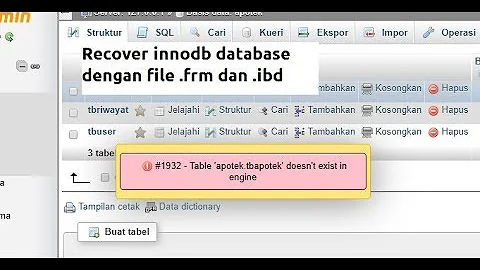Log the error and warning while restoring the sql dump on MySql
Solution 1
To redirect MySQL errors and warnings to a log file, restore the SQL dump from bash not from a MySQL prompt.
mysql -u root -p db_name < dumpfilename.sql > /var/tmp/mysqldump.log 2>&1
If you need to supresss foreign key checks, create a shell script named mysql-import.sh and put the following contents in it:
#!/bin/bash
mysql -u root -p'password' -h hostname db_name << EOF
CREATE DATABASE dbname;
USE dbname;
SET foreign_key_checks=0;
SOURCE dbdumpname.sql;
EOF
Then chmod +x mysql-import.sh to make the script executable and run the script as,
./mysql-import.sh > /var/log/mysqldump.log 2>&1
This script will run the code that you were running in MySQL, but with the ability to redirect output to a log file, since it can be invoked from the shell.
Solution 2
The mysql client offers a useful --tee <tofile> option. Either enable it at startup, or interactively in the prompt.
mysql> tee file.log
Logging to file 'file.log'
mysql> \W
Show warnings enabled.
mysql> use database;
mysql> source dump.sql;
Note the description in the docs
All the data displayed on the screen is appended into a given file. [..] Tee functionality works only in interactive mode.
Related videos on Youtube
Aha
Updated on September 18, 2022Comments
-
Aha over 1 year
How to log the error and warning while restoring the SQL dump on MySQL ?
Following are the steps we were doing.
mysql> CREATE DATABASE dbname; mysql> USE dbname; mysql> SOURCE dbdumpname.sql -
Sachin Divekar over 12 years@Arun I am not getting your question.
-
Aha over 12 yearsWhile restoring the dump there are possibility of exception due to foreignkey_checks. So we are doing the same as follows.mysql> CREATE DATABASE dbname; mysql> USE dbname; mysql > set foreign_key_checks=0; mysql> SOURCE dbdumpname.sql; How can I do this with mysql -u root -p db_name < dumpfilename.sql > /var/tmp/mysqldump.log 2>&1
-
Sachin Divekar over 12 years@Arun I have updated the answer. Check if it is working.




